Food Security in Nigeria: A Sociological Analysis of SDG 2 Progress
VerifiedAdded on 2023/04/24
|11
|2712
|68
Essay
AI Summary
This essay provides a comprehensive sociological analysis of food security in Nigeria, focusing on the country's progress towards achieving Sustainable Development Goal 2 (Zero Hunger) by 2030. The essay delves into historical, cultural, and structural factors contributing to food insecurity, including policy implementation, cultural practices, and institutional weaknesses. It examines the impact of these factors on undernutrition, poverty, and access to food, highlighting the challenges and barriers faced. The essay also presents critical analysis of data and evidence related to health indicators, such as undernutrition rates, and economic factors like GDP, to assess Nigeria's current standing. Furthermore, it explores both barriers to and enablers of food production and nutrition, including gender inequality, insufficient production, and inefficient policies. Finally, the essay concludes that, based on the evidence, Nigeria is unlikely to end hunger by 2030, emphasizing the need for strengthened policy frameworks and institutional reforms to improve food and nutrition security.
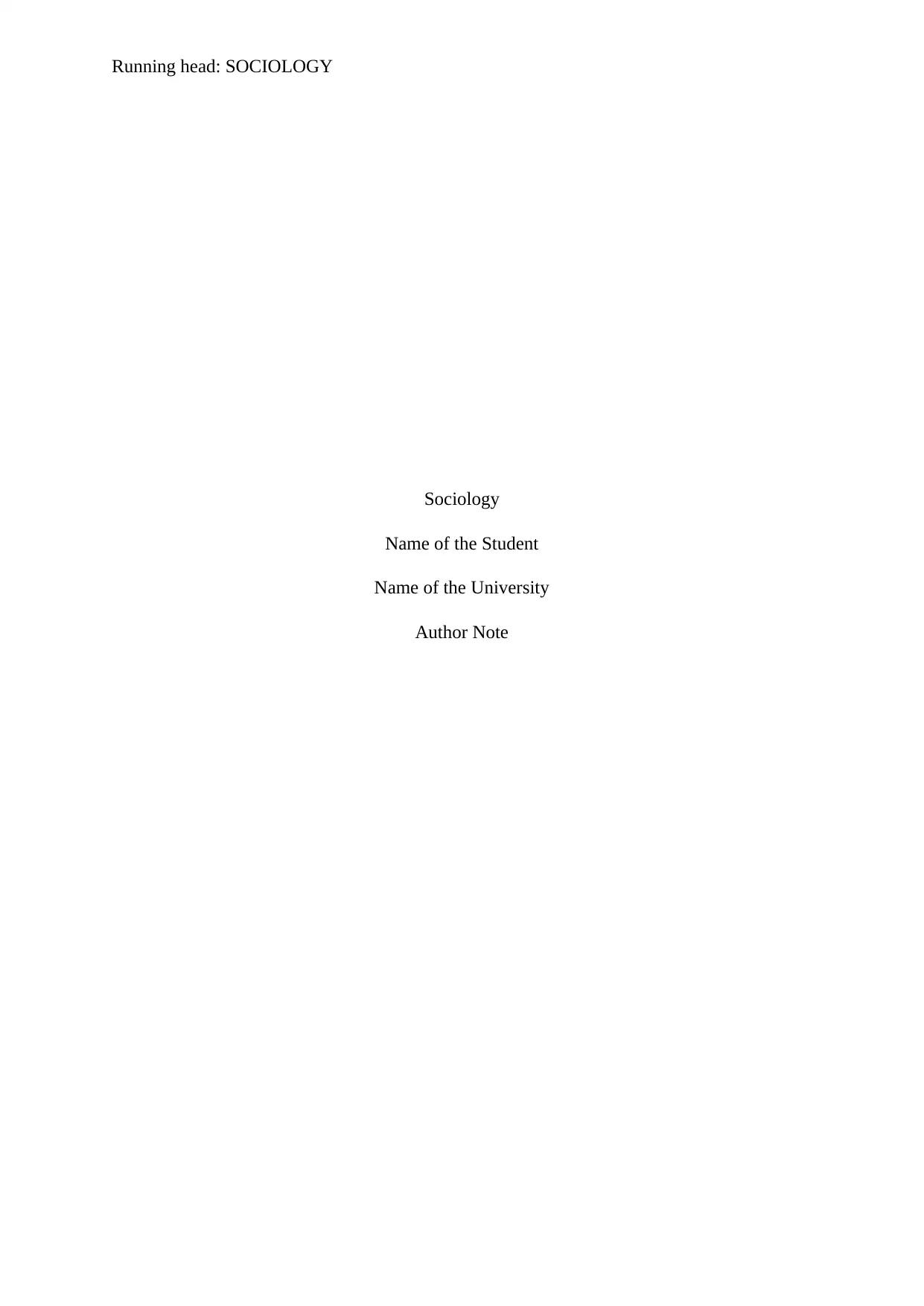
Running head: SOCIOLOGY
Sociology
Name of the Student
Name of the University
Author Note
Sociology
Name of the Student
Name of the University
Author Note
Paraphrase This Document
Need a fresh take? Get an instant paraphrase of this document with our AI Paraphraser
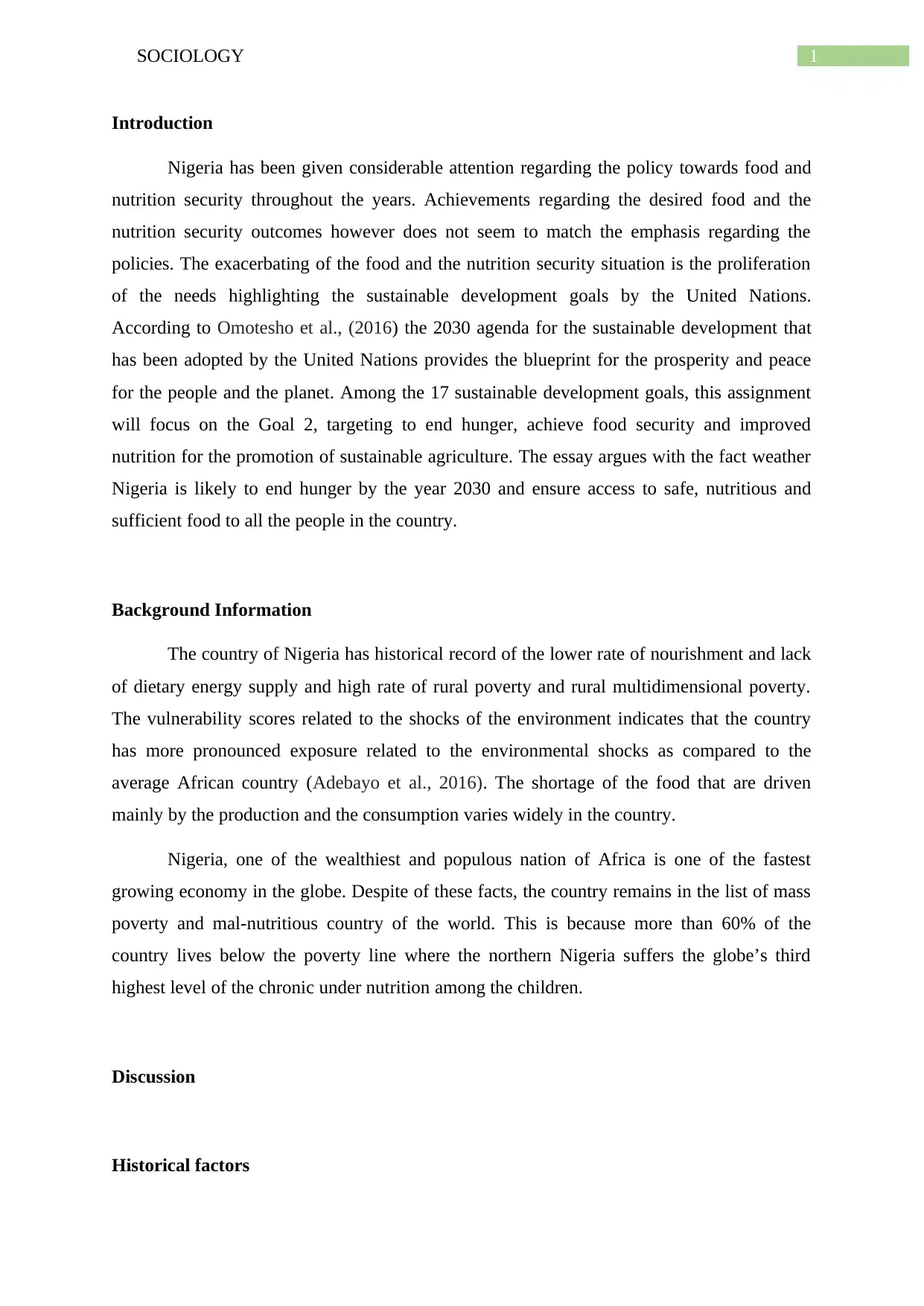
1SOCIOLOGY
Introduction
Nigeria has been given considerable attention regarding the policy towards food and
nutrition security throughout the years. Achievements regarding the desired food and the
nutrition security outcomes however does not seem to match the emphasis regarding the
policies. The exacerbating of the food and the nutrition security situation is the proliferation
of the needs highlighting the sustainable development goals by the United Nations.
According to Omotesho et al., (2016) the 2030 agenda for the sustainable development that
has been adopted by the United Nations provides the blueprint for the prosperity and peace
for the people and the planet. Among the 17 sustainable development goals, this assignment
will focus on the Goal 2, targeting to end hunger, achieve food security and improved
nutrition for the promotion of sustainable agriculture. The essay argues with the fact weather
Nigeria is likely to end hunger by the year 2030 and ensure access to safe, nutritious and
sufficient food to all the people in the country.
Background Information
The country of Nigeria has historical record of the lower rate of nourishment and lack
of dietary energy supply and high rate of rural poverty and rural multidimensional poverty.
The vulnerability scores related to the shocks of the environment indicates that the country
has more pronounced exposure related to the environmental shocks as compared to the
average African country (Adebayo et al., 2016). The shortage of the food that are driven
mainly by the production and the consumption varies widely in the country.
Nigeria, one of the wealthiest and populous nation of Africa is one of the fastest
growing economy in the globe. Despite of these facts, the country remains in the list of mass
poverty and mal-nutritious country of the world. This is because more than 60% of the
country lives below the poverty line where the northern Nigeria suffers the globe’s third
highest level of the chronic under nutrition among the children.
Discussion
Historical factors
Introduction
Nigeria has been given considerable attention regarding the policy towards food and
nutrition security throughout the years. Achievements regarding the desired food and the
nutrition security outcomes however does not seem to match the emphasis regarding the
policies. The exacerbating of the food and the nutrition security situation is the proliferation
of the needs highlighting the sustainable development goals by the United Nations.
According to Omotesho et al., (2016) the 2030 agenda for the sustainable development that
has been adopted by the United Nations provides the blueprint for the prosperity and peace
for the people and the planet. Among the 17 sustainable development goals, this assignment
will focus on the Goal 2, targeting to end hunger, achieve food security and improved
nutrition for the promotion of sustainable agriculture. The essay argues with the fact weather
Nigeria is likely to end hunger by the year 2030 and ensure access to safe, nutritious and
sufficient food to all the people in the country.
Background Information
The country of Nigeria has historical record of the lower rate of nourishment and lack
of dietary energy supply and high rate of rural poverty and rural multidimensional poverty.
The vulnerability scores related to the shocks of the environment indicates that the country
has more pronounced exposure related to the environmental shocks as compared to the
average African country (Adebayo et al., 2016). The shortage of the food that are driven
mainly by the production and the consumption varies widely in the country.
Nigeria, one of the wealthiest and populous nation of Africa is one of the fastest
growing economy in the globe. Despite of these facts, the country remains in the list of mass
poverty and mal-nutritious country of the world. This is because more than 60% of the
country lives below the poverty line where the northern Nigeria suffers the globe’s third
highest level of the chronic under nutrition among the children.
Discussion
Historical factors
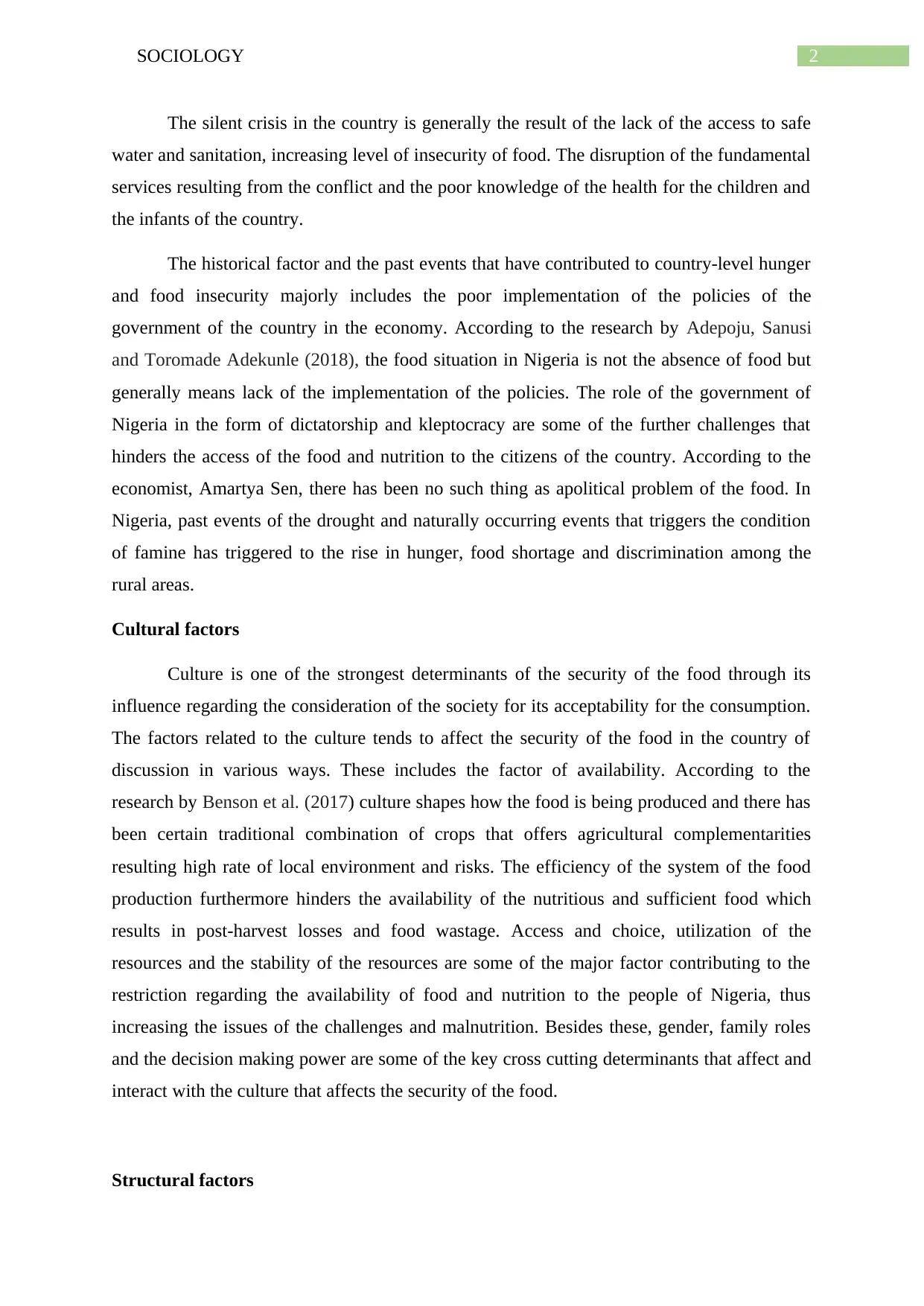
2SOCIOLOGY
The silent crisis in the country is generally the result of the lack of the access to safe
water and sanitation, increasing level of insecurity of food. The disruption of the fundamental
services resulting from the conflict and the poor knowledge of the health for the children and
the infants of the country.
The historical factor and the past events that have contributed to country-level hunger
and food insecurity majorly includes the poor implementation of the policies of the
government of the country in the economy. According to the research by Adepoju, Sanusi
and Toromade Adekunle (2018), the food situation in Nigeria is not the absence of food but
generally means lack of the implementation of the policies. The role of the government of
Nigeria in the form of dictatorship and kleptocracy are some of the further challenges that
hinders the access of the food and nutrition to the citizens of the country. According to the
economist, Amartya Sen, there has been no such thing as apolitical problem of the food. In
Nigeria, past events of the drought and naturally occurring events that triggers the condition
of famine has triggered to the rise in hunger, food shortage and discrimination among the
rural areas.
Cultural factors
Culture is one of the strongest determinants of the security of the food through its
influence regarding the consideration of the society for its acceptability for the consumption.
The factors related to the culture tends to affect the security of the food in the country of
discussion in various ways. These includes the factor of availability. According to the
research by Benson et al. (2017) culture shapes how the food is being produced and there has
been certain traditional combination of crops that offers agricultural complementarities
resulting high rate of local environment and risks. The efficiency of the system of the food
production furthermore hinders the availability of the nutritious and sufficient food which
results in post-harvest losses and food wastage. Access and choice, utilization of the
resources and the stability of the resources are some of the major factor contributing to the
restriction regarding the availability of food and nutrition to the people of Nigeria, thus
increasing the issues of the challenges and malnutrition. Besides these, gender, family roles
and the decision making power are some of the key cross cutting determinants that affect and
interact with the culture that affects the security of the food.
Structural factors
The silent crisis in the country is generally the result of the lack of the access to safe
water and sanitation, increasing level of insecurity of food. The disruption of the fundamental
services resulting from the conflict and the poor knowledge of the health for the children and
the infants of the country.
The historical factor and the past events that have contributed to country-level hunger
and food insecurity majorly includes the poor implementation of the policies of the
government of the country in the economy. According to the research by Adepoju, Sanusi
and Toromade Adekunle (2018), the food situation in Nigeria is not the absence of food but
generally means lack of the implementation of the policies. The role of the government of
Nigeria in the form of dictatorship and kleptocracy are some of the further challenges that
hinders the access of the food and nutrition to the citizens of the country. According to the
economist, Amartya Sen, there has been no such thing as apolitical problem of the food. In
Nigeria, past events of the drought and naturally occurring events that triggers the condition
of famine has triggered to the rise in hunger, food shortage and discrimination among the
rural areas.
Cultural factors
Culture is one of the strongest determinants of the security of the food through its
influence regarding the consideration of the society for its acceptability for the consumption.
The factors related to the culture tends to affect the security of the food in the country of
discussion in various ways. These includes the factor of availability. According to the
research by Benson et al. (2017) culture shapes how the food is being produced and there has
been certain traditional combination of crops that offers agricultural complementarities
resulting high rate of local environment and risks. The efficiency of the system of the food
production furthermore hinders the availability of the nutritious and sufficient food which
results in post-harvest losses and food wastage. Access and choice, utilization of the
resources and the stability of the resources are some of the major factor contributing to the
restriction regarding the availability of food and nutrition to the people of Nigeria, thus
increasing the issues of the challenges and malnutrition. Besides these, gender, family roles
and the decision making power are some of the key cross cutting determinants that affect and
interact with the culture that affects the security of the food.
Structural factors
⊘ This is a preview!⊘
Do you want full access?
Subscribe today to unlock all pages.

Trusted by 1+ million students worldwide
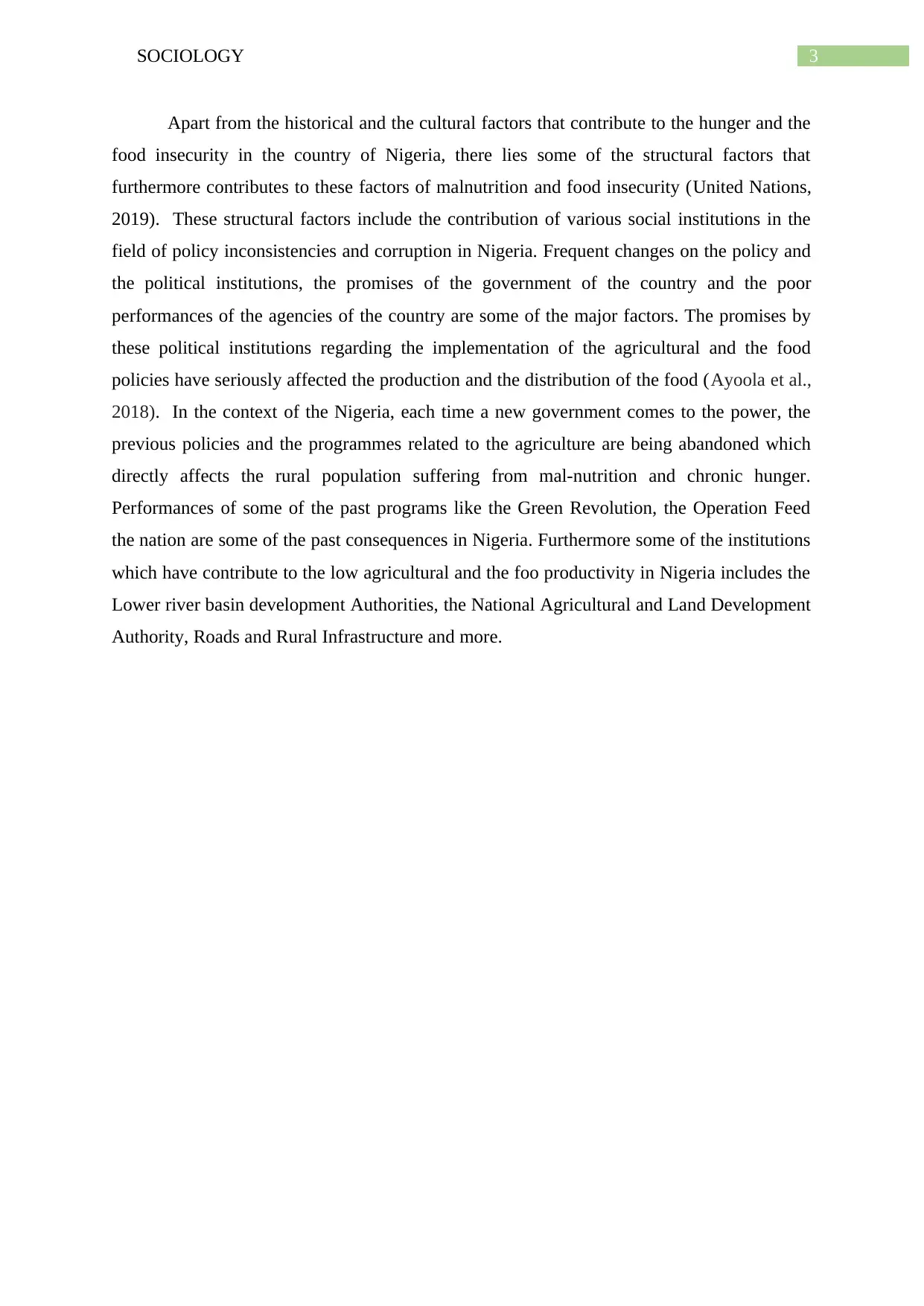
3SOCIOLOGY
Apart from the historical and the cultural factors that contribute to the hunger and the
food insecurity in the country of Nigeria, there lies some of the structural factors that
furthermore contributes to these factors of malnutrition and food insecurity (United Nations,
2019). These structural factors include the contribution of various social institutions in the
field of policy inconsistencies and corruption in Nigeria. Frequent changes on the policy and
the political institutions, the promises of the government of the country and the poor
performances of the agencies of the country are some of the major factors. The promises by
these political institutions regarding the implementation of the agricultural and the food
policies have seriously affected the production and the distribution of the food (Ayoola et al.,
2018). In the context of the Nigeria, each time a new government comes to the power, the
previous policies and the programmes related to the agriculture are being abandoned which
directly affects the rural population suffering from mal-nutrition and chronic hunger.
Performances of some of the past programs like the Green Revolution, the Operation Feed
the nation are some of the past consequences in Nigeria. Furthermore some of the institutions
which have contribute to the low agricultural and the foo productivity in Nigeria includes the
Lower river basin development Authorities, the National Agricultural and Land Development
Authority, Roads and Rural Infrastructure and more.
Apart from the historical and the cultural factors that contribute to the hunger and the
food insecurity in the country of Nigeria, there lies some of the structural factors that
furthermore contributes to these factors of malnutrition and food insecurity (United Nations,
2019). These structural factors include the contribution of various social institutions in the
field of policy inconsistencies and corruption in Nigeria. Frequent changes on the policy and
the political institutions, the promises of the government of the country and the poor
performances of the agencies of the country are some of the major factors. The promises by
these political institutions regarding the implementation of the agricultural and the food
policies have seriously affected the production and the distribution of the food (Ayoola et al.,
2018). In the context of the Nigeria, each time a new government comes to the power, the
previous policies and the programmes related to the agriculture are being abandoned which
directly affects the rural population suffering from mal-nutrition and chronic hunger.
Performances of some of the past programs like the Green Revolution, the Operation Feed
the nation are some of the past consequences in Nigeria. Furthermore some of the institutions
which have contribute to the low agricultural and the foo productivity in Nigeria includes the
Lower river basin development Authorities, the National Agricultural and Land Development
Authority, Roads and Rural Infrastructure and more.
Paraphrase This Document
Need a fresh take? Get an instant paraphrase of this document with our AI Paraphraser
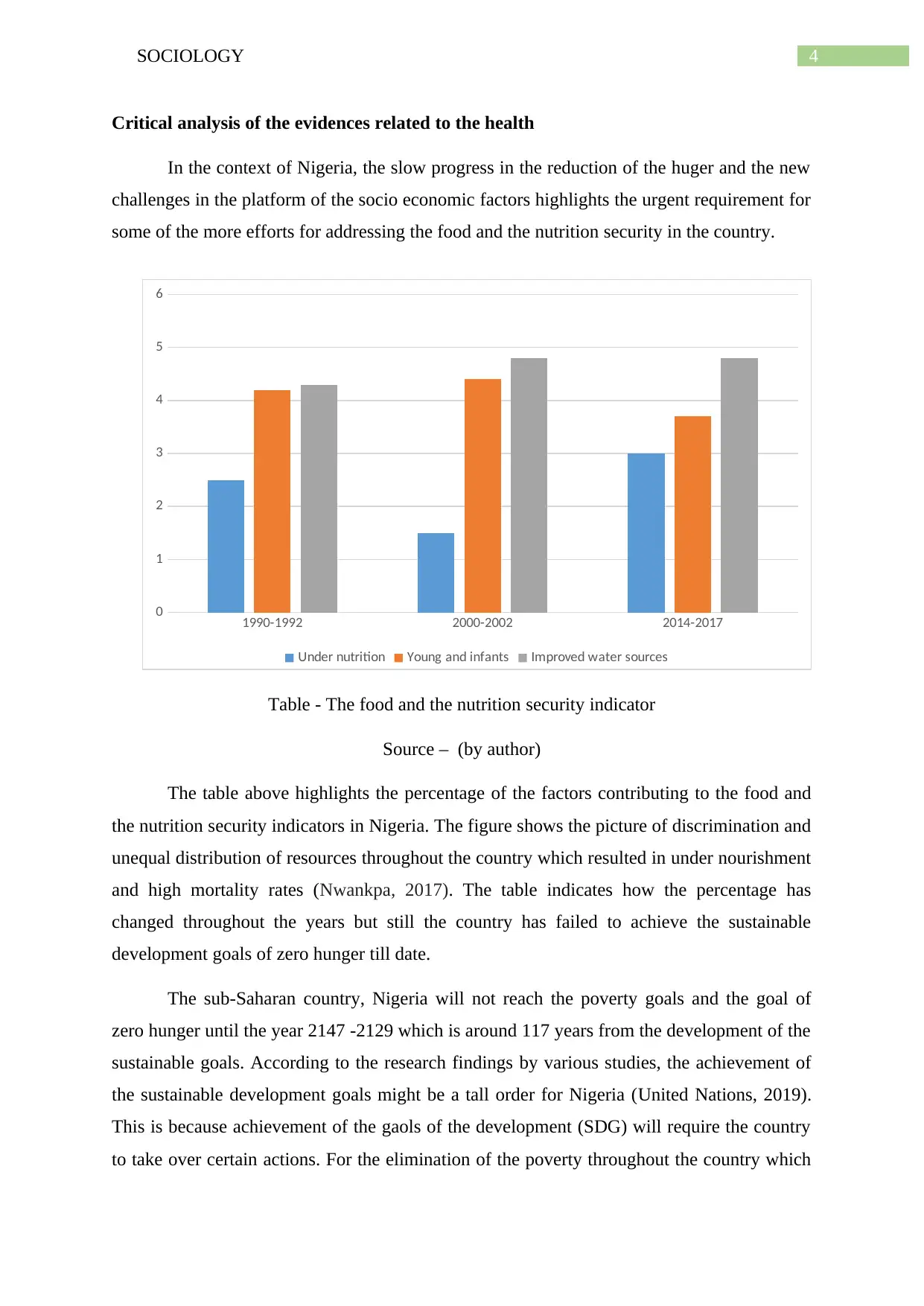
4SOCIOLOGY
Critical analysis of the evidences related to the health
In the context of Nigeria, the slow progress in the reduction of the huger and the new
challenges in the platform of the socio economic factors highlights the urgent requirement for
some of the more efforts for addressing the food and the nutrition security in the country.
Table - The food and the nutrition security indicator
Source – (by author)
The table above highlights the percentage of the factors contributing to the food and
the nutrition security indicators in Nigeria. The figure shows the picture of discrimination and
unequal distribution of resources throughout the country which resulted in under nourishment
and high mortality rates (Nwankpa, 2017). The table indicates how the percentage has
changed throughout the years but still the country has failed to achieve the sustainable
development goals of zero hunger till date.
The sub-Saharan country, Nigeria will not reach the poverty goals and the goal of
zero hunger until the year 2147 -2129 which is around 117 years from the development of the
sustainable goals. According to the research findings by various studies, the achievement of
the sustainable development goals might be a tall order for Nigeria (United Nations, 2019).
This is because achievement of the gaols of the development (SDG) will require the country
to take over certain actions. For the elimination of the poverty throughout the country which
1990-1992 2000-2002 2014-2017
0
1
2
3
4
5
6
Under nutrition Young and infants Improved water sources
Critical analysis of the evidences related to the health
In the context of Nigeria, the slow progress in the reduction of the huger and the new
challenges in the platform of the socio economic factors highlights the urgent requirement for
some of the more efforts for addressing the food and the nutrition security in the country.
Table - The food and the nutrition security indicator
Source – (by author)
The table above highlights the percentage of the factors contributing to the food and
the nutrition security indicators in Nigeria. The figure shows the picture of discrimination and
unequal distribution of resources throughout the country which resulted in under nourishment
and high mortality rates (Nwankpa, 2017). The table indicates how the percentage has
changed throughout the years but still the country has failed to achieve the sustainable
development goals of zero hunger till date.
The sub-Saharan country, Nigeria will not reach the poverty goals and the goal of
zero hunger until the year 2147 -2129 which is around 117 years from the development of the
sustainable goals. According to the research findings by various studies, the achievement of
the sustainable development goals might be a tall order for Nigeria (United Nations, 2019).
This is because achievement of the gaols of the development (SDG) will require the country
to take over certain actions. For the elimination of the poverty throughout the country which
1990-1992 2000-2002 2014-2017
0
1
2
3
4
5
6
Under nutrition Young and infants Improved water sources
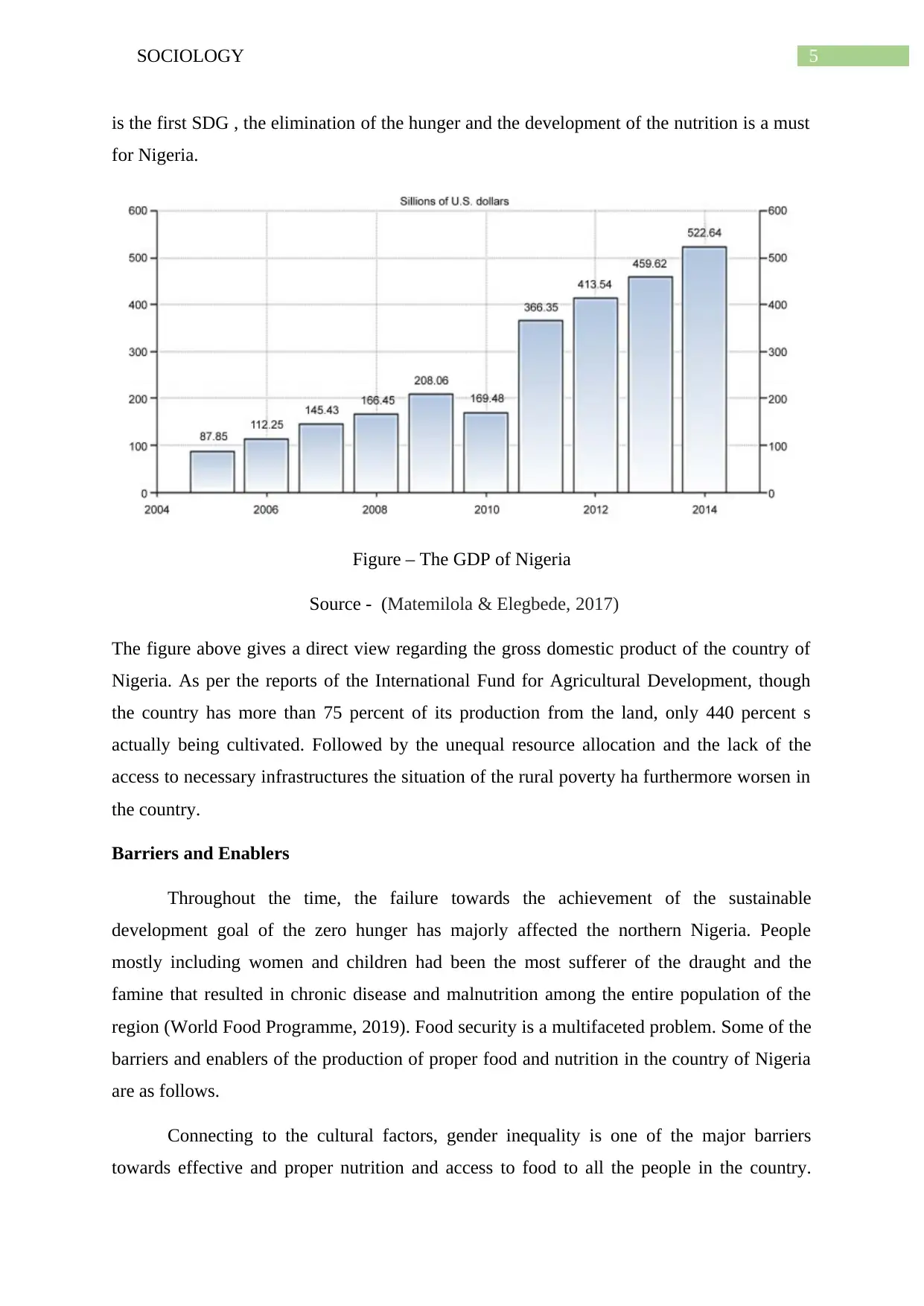
5SOCIOLOGY
is the first SDG , the elimination of the hunger and the development of the nutrition is a must
for Nigeria.
Figure – The GDP of Nigeria
Source - (Matemilola & Elegbede, 2017)
The figure above gives a direct view regarding the gross domestic product of the country of
Nigeria. As per the reports of the International Fund for Agricultural Development, though
the country has more than 75 percent of its production from the land, only 440 percent s
actually being cultivated. Followed by the unequal resource allocation and the lack of the
access to necessary infrastructures the situation of the rural poverty ha furthermore worsen in
the country.
Barriers and Enablers
Throughout the time, the failure towards the achievement of the sustainable
development goal of the zero hunger has majorly affected the northern Nigeria. People
mostly including women and children had been the most sufferer of the draught and the
famine that resulted in chronic disease and malnutrition among the entire population of the
region (World Food Programme, 2019). Food security is a multifaceted problem. Some of the
barriers and enablers of the production of proper food and nutrition in the country of Nigeria
are as follows.
Connecting to the cultural factors, gender inequality is one of the major barriers
towards effective and proper nutrition and access to food to all the people in the country.
is the first SDG , the elimination of the hunger and the development of the nutrition is a must
for Nigeria.
Figure – The GDP of Nigeria
Source - (Matemilola & Elegbede, 2017)
The figure above gives a direct view regarding the gross domestic product of the country of
Nigeria. As per the reports of the International Fund for Agricultural Development, though
the country has more than 75 percent of its production from the land, only 440 percent s
actually being cultivated. Followed by the unequal resource allocation and the lack of the
access to necessary infrastructures the situation of the rural poverty ha furthermore worsen in
the country.
Barriers and Enablers
Throughout the time, the failure towards the achievement of the sustainable
development goal of the zero hunger has majorly affected the northern Nigeria. People
mostly including women and children had been the most sufferer of the draught and the
famine that resulted in chronic disease and malnutrition among the entire population of the
region (World Food Programme, 2019). Food security is a multifaceted problem. Some of the
barriers and enablers of the production of proper food and nutrition in the country of Nigeria
are as follows.
Connecting to the cultural factors, gender inequality is one of the major barriers
towards effective and proper nutrition and access to food to all the people in the country.
⊘ This is a preview!⊘
Do you want full access?
Subscribe today to unlock all pages.

Trusted by 1+ million students worldwide
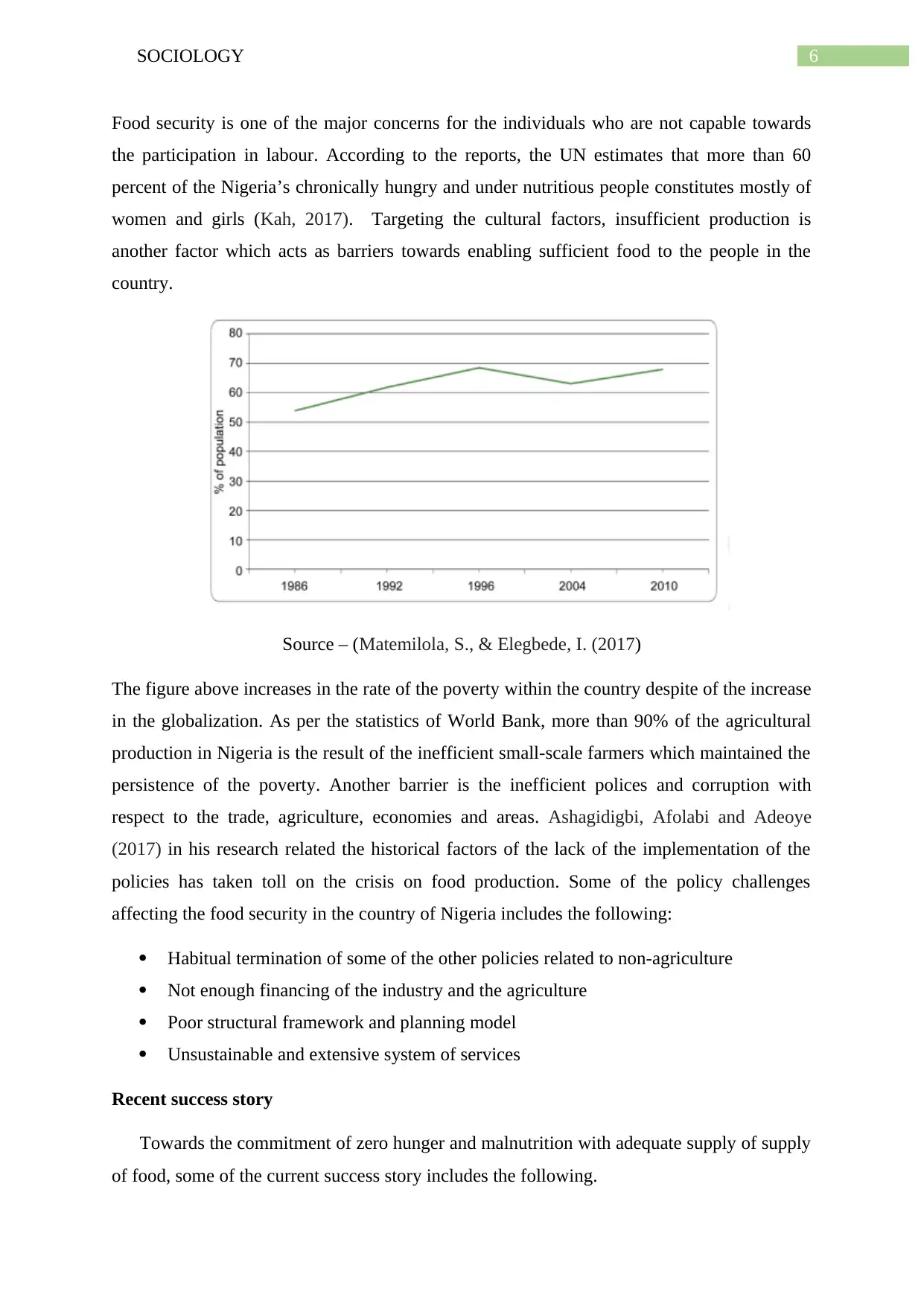
6SOCIOLOGY
Food security is one of the major concerns for the individuals who are not capable towards
the participation in labour. According to the reports, the UN estimates that more than 60
percent of the Nigeria’s chronically hungry and under nutritious people constitutes mostly of
women and girls (Kah, 2017). Targeting the cultural factors, insufficient production is
another factor which acts as barriers towards enabling sufficient food to the people in the
country.
Source – (Matemilola, S., & Elegbede, I. (2017)
The figure above increases in the rate of the poverty within the country despite of the increase
in the globalization. As per the statistics of World Bank, more than 90% of the agricultural
production in Nigeria is the result of the inefficient small-scale farmers which maintained the
persistence of the poverty. Another barrier is the inefficient polices and corruption with
respect to the trade, agriculture, economies and areas. Ashagidigbi, Afolabi and Adeoye
(2017) in his research related the historical factors of the lack of the implementation of the
policies has taken toll on the crisis on food production. Some of the policy challenges
affecting the food security in the country of Nigeria includes the following:
Habitual termination of some of the other policies related to non-agriculture
Not enough financing of the industry and the agriculture
Poor structural framework and planning model
Unsustainable and extensive system of services
Recent success story
Towards the commitment of zero hunger and malnutrition with adequate supply of supply
of food, some of the current success story includes the following.
Food security is one of the major concerns for the individuals who are not capable towards
the participation in labour. According to the reports, the UN estimates that more than 60
percent of the Nigeria’s chronically hungry and under nutritious people constitutes mostly of
women and girls (Kah, 2017). Targeting the cultural factors, insufficient production is
another factor which acts as barriers towards enabling sufficient food to the people in the
country.
Source – (Matemilola, S., & Elegbede, I. (2017)
The figure above increases in the rate of the poverty within the country despite of the increase
in the globalization. As per the statistics of World Bank, more than 90% of the agricultural
production in Nigeria is the result of the inefficient small-scale farmers which maintained the
persistence of the poverty. Another barrier is the inefficient polices and corruption with
respect to the trade, agriculture, economies and areas. Ashagidigbi, Afolabi and Adeoye
(2017) in his research related the historical factors of the lack of the implementation of the
policies has taken toll on the crisis on food production. Some of the policy challenges
affecting the food security in the country of Nigeria includes the following:
Habitual termination of some of the other policies related to non-agriculture
Not enough financing of the industry and the agriculture
Poor structural framework and planning model
Unsustainable and extensive system of services
Recent success story
Towards the commitment of zero hunger and malnutrition with adequate supply of supply
of food, some of the current success story includes the following.
Paraphrase This Document
Need a fresh take? Get an instant paraphrase of this document with our AI Paraphraser
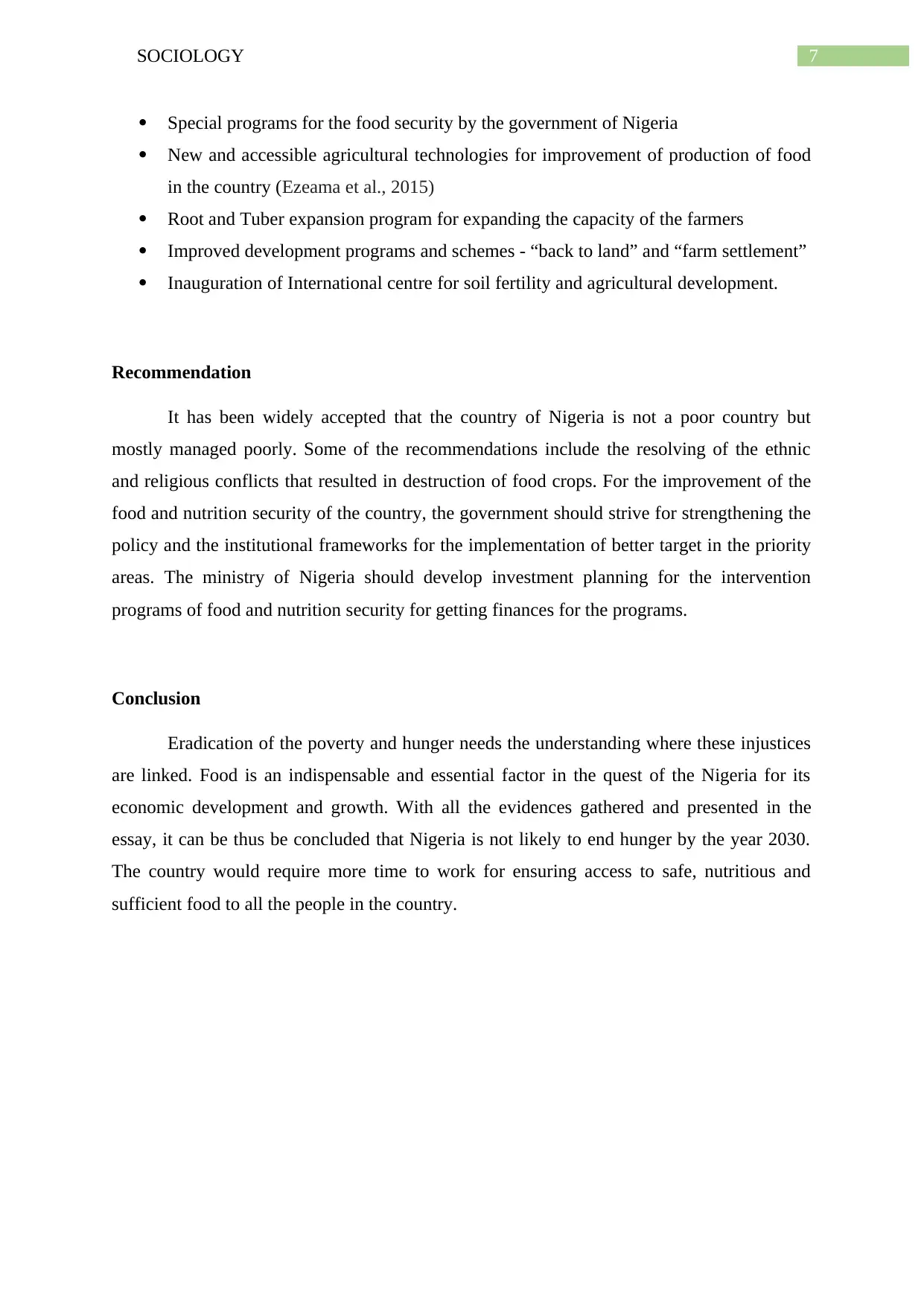
7SOCIOLOGY
Special programs for the food security by the government of Nigeria
New and accessible agricultural technologies for improvement of production of food
in the country (Ezeama et al., 2015)
Root and Tuber expansion program for expanding the capacity of the farmers
Improved development programs and schemes - “back to land” and “farm settlement”
Inauguration of International centre for soil fertility and agricultural development.
Recommendation
It has been widely accepted that the country of Nigeria is not a poor country but
mostly managed poorly. Some of the recommendations include the resolving of the ethnic
and religious conflicts that resulted in destruction of food crops. For the improvement of the
food and nutrition security of the country, the government should strive for strengthening the
policy and the institutional frameworks for the implementation of better target in the priority
areas. The ministry of Nigeria should develop investment planning for the intervention
programs of food and nutrition security for getting finances for the programs.
Conclusion
Eradication of the poverty and hunger needs the understanding where these injustices
are linked. Food is an indispensable and essential factor in the quest of the Nigeria for its
economic development and growth. With all the evidences gathered and presented in the
essay, it can be thus be concluded that Nigeria is not likely to end hunger by the year 2030.
The country would require more time to work for ensuring access to safe, nutritious and
sufficient food to all the people in the country.
Special programs for the food security by the government of Nigeria
New and accessible agricultural technologies for improvement of production of food
in the country (Ezeama et al., 2015)
Root and Tuber expansion program for expanding the capacity of the farmers
Improved development programs and schemes - “back to land” and “farm settlement”
Inauguration of International centre for soil fertility and agricultural development.
Recommendation
It has been widely accepted that the country of Nigeria is not a poor country but
mostly managed poorly. Some of the recommendations include the resolving of the ethnic
and religious conflicts that resulted in destruction of food crops. For the improvement of the
food and nutrition security of the country, the government should strive for strengthening the
policy and the institutional frameworks for the implementation of better target in the priority
areas. The ministry of Nigeria should develop investment planning for the intervention
programs of food and nutrition security for getting finances for the programs.
Conclusion
Eradication of the poverty and hunger needs the understanding where these injustices
are linked. Food is an indispensable and essential factor in the quest of the Nigeria for its
economic development and growth. With all the evidences gathered and presented in the
essay, it can be thus be concluded that Nigeria is not likely to end hunger by the year 2030.
The country would require more time to work for ensuring access to safe, nutritious and
sufficient food to all the people in the country.
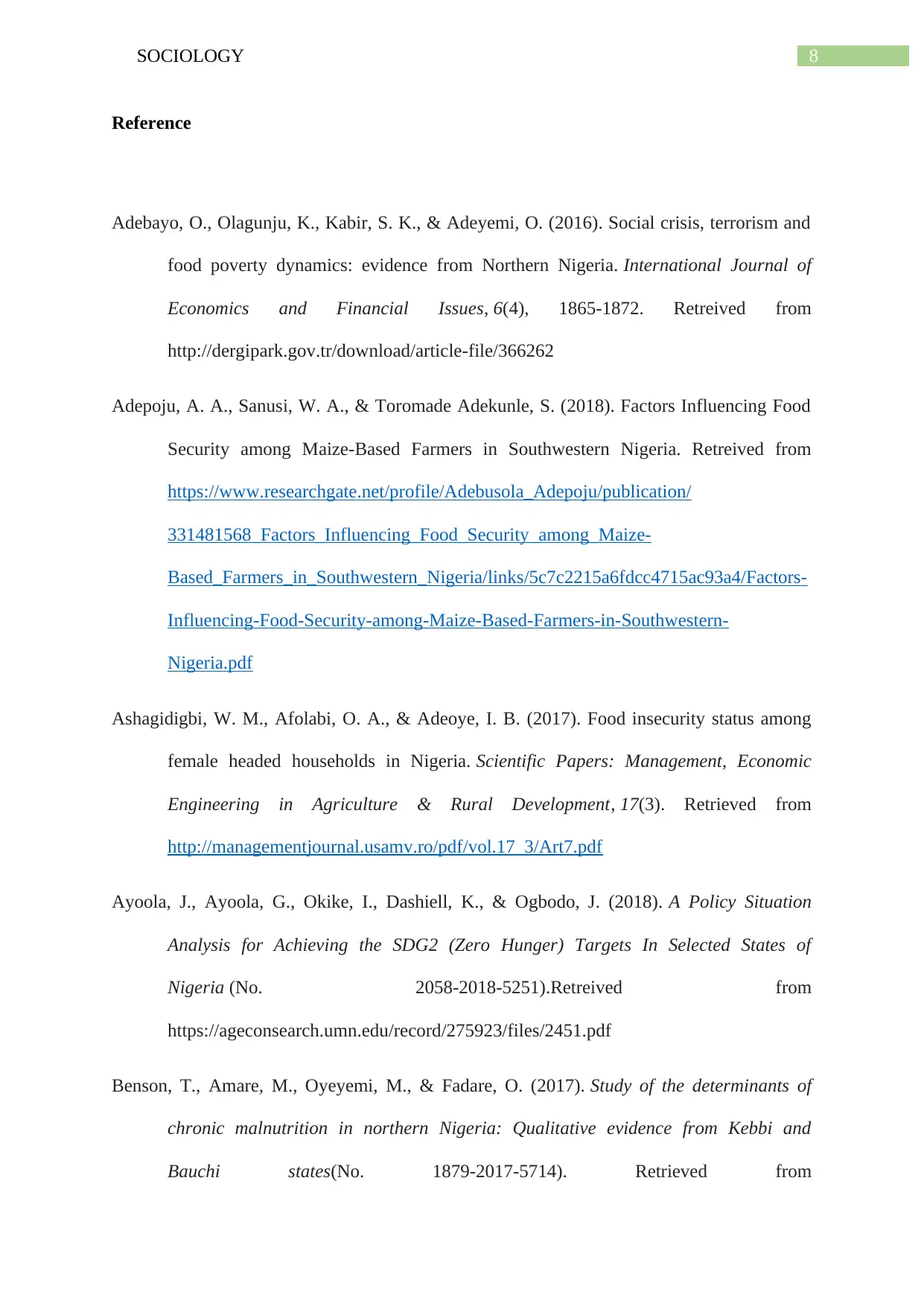
8SOCIOLOGY
Reference
Adebayo, O., Olagunju, K., Kabir, S. K., & Adeyemi, O. (2016). Social crisis, terrorism and
food poverty dynamics: evidence from Northern Nigeria. International Journal of
Economics and Financial Issues, 6(4), 1865-1872. Retreived from
http://dergipark.gov.tr/download/article-file/366262
Adepoju, A. A., Sanusi, W. A., & Toromade Adekunle, S. (2018). Factors Influencing Food
Security among Maize-Based Farmers in Southwestern Nigeria. Retreived from
https://www.researchgate.net/profile/Adebusola_Adepoju/publication/
331481568_Factors_Influencing_Food_Security_among_Maize-
Based_Farmers_in_Southwestern_Nigeria/links/5c7c2215a6fdcc4715ac93a4/Factors-
Influencing-Food-Security-among-Maize-Based-Farmers-in-Southwestern-
Nigeria.pdf
Ashagidigbi, W. M., Afolabi, O. A., & Adeoye, I. B. (2017). Food insecurity status among
female headed households in Nigeria. Scientific Papers: Management, Economic
Engineering in Agriculture & Rural Development, 17(3). Retrieved from
http://managementjournal.usamv.ro/pdf/vol.17_3/Art7.pdf
Ayoola, J., Ayoola, G., Okike, I., Dashiell, K., & Ogbodo, J. (2018). A Policy Situation
Analysis for Achieving the SDG2 (Zero Hunger) Targets In Selected States of
Nigeria (No. 2058-2018-5251).Retreived from
https://ageconsearch.umn.edu/record/275923/files/2451.pdf
Benson, T., Amare, M., Oyeyemi, M., & Fadare, O. (2017). Study of the determinants of
chronic malnutrition in northern Nigeria: Qualitative evidence from Kebbi and
Bauchi states(No. 1879-2017-5714). Retrieved from
Reference
Adebayo, O., Olagunju, K., Kabir, S. K., & Adeyemi, O. (2016). Social crisis, terrorism and
food poverty dynamics: evidence from Northern Nigeria. International Journal of
Economics and Financial Issues, 6(4), 1865-1872. Retreived from
http://dergipark.gov.tr/download/article-file/366262
Adepoju, A. A., Sanusi, W. A., & Toromade Adekunle, S. (2018). Factors Influencing Food
Security among Maize-Based Farmers in Southwestern Nigeria. Retreived from
https://www.researchgate.net/profile/Adebusola_Adepoju/publication/
331481568_Factors_Influencing_Food_Security_among_Maize-
Based_Farmers_in_Southwestern_Nigeria/links/5c7c2215a6fdcc4715ac93a4/Factors-
Influencing-Food-Security-among-Maize-Based-Farmers-in-Southwestern-
Nigeria.pdf
Ashagidigbi, W. M., Afolabi, O. A., & Adeoye, I. B. (2017). Food insecurity status among
female headed households in Nigeria. Scientific Papers: Management, Economic
Engineering in Agriculture & Rural Development, 17(3). Retrieved from
http://managementjournal.usamv.ro/pdf/vol.17_3/Art7.pdf
Ayoola, J., Ayoola, G., Okike, I., Dashiell, K., & Ogbodo, J. (2018). A Policy Situation
Analysis for Achieving the SDG2 (Zero Hunger) Targets In Selected States of
Nigeria (No. 2058-2018-5251).Retreived from
https://ageconsearch.umn.edu/record/275923/files/2451.pdf
Benson, T., Amare, M., Oyeyemi, M., & Fadare, O. (2017). Study of the determinants of
chronic malnutrition in northern Nigeria: Qualitative evidence from Kebbi and
Bauchi states(No. 1879-2017-5714). Retrieved from
⊘ This is a preview!⊘
Do you want full access?
Subscribe today to unlock all pages.

Trusted by 1+ million students worldwide
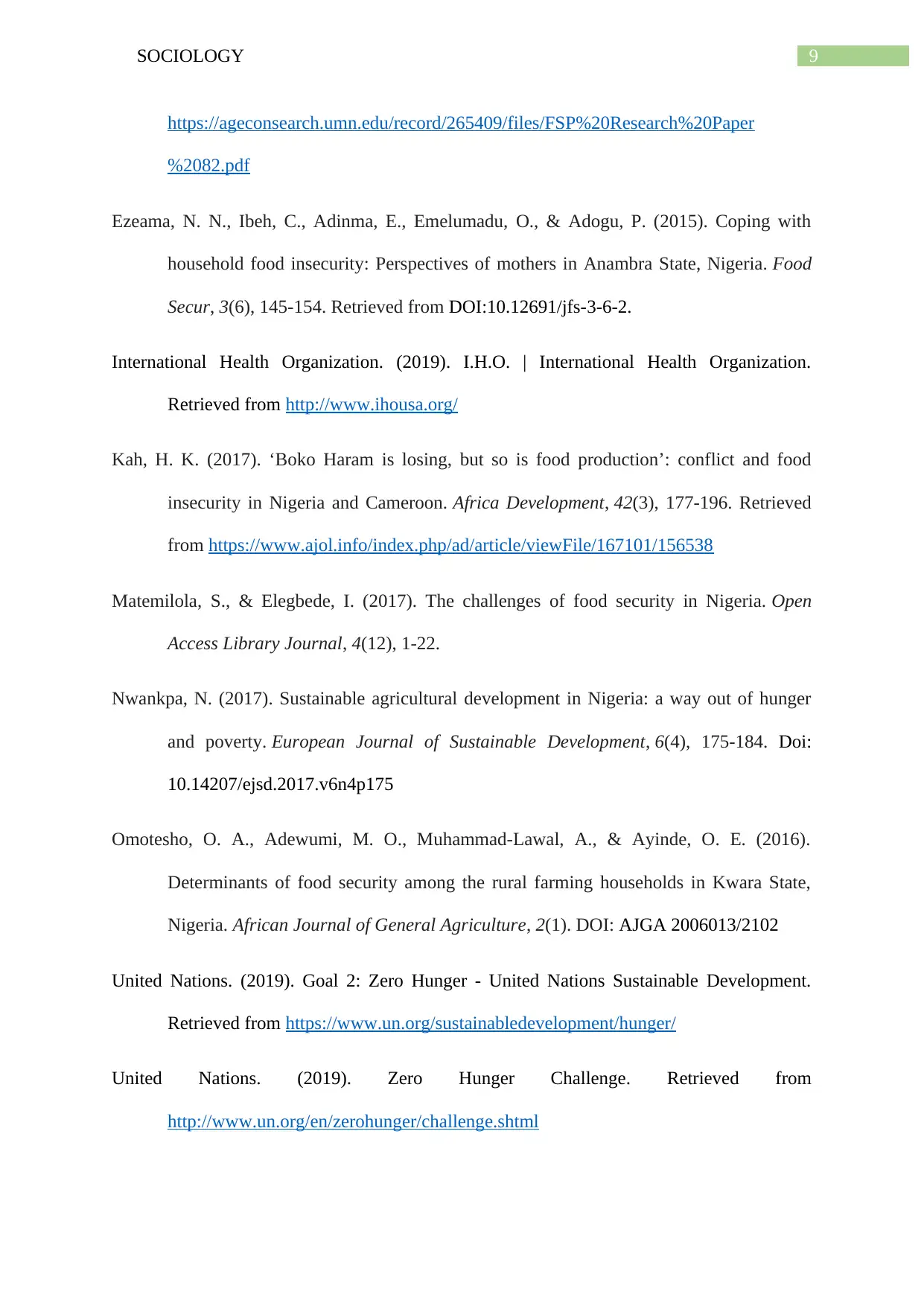
9SOCIOLOGY
https://ageconsearch.umn.edu/record/265409/files/FSP%20Research%20Paper
%2082.pdf
Ezeama, N. N., Ibeh, C., Adinma, E., Emelumadu, O., & Adogu, P. (2015). Coping with
household food insecurity: Perspectives of mothers in Anambra State, Nigeria. Food
Secur, 3(6), 145-154. Retrieved from DOI:10.12691/jfs-3-6-2.
International Health Organization. (2019). I.H.O. | International Health Organization.
Retrieved from http://www.ihousa.org/
Kah, H. K. (2017). ‘Boko Haram is losing, but so is food production’: conflict and food
insecurity in Nigeria and Cameroon. Africa Development, 42(3), 177-196. Retrieved
from https://www.ajol.info/index.php/ad/article/viewFile/167101/156538
Matemilola, S., & Elegbede, I. (2017). The challenges of food security in Nigeria. Open
Access Library Journal, 4(12), 1-22.
Nwankpa, N. (2017). Sustainable agricultural development in Nigeria: a way out of hunger
and poverty. European Journal of Sustainable Development, 6(4), 175-184. Doi:
10.14207/ejsd.2017.v6n4p175
Omotesho, O. A., Adewumi, M. O., Muhammad-Lawal, A., & Ayinde, O. E. (2016).
Determinants of food security among the rural farming households in Kwara State,
Nigeria. African Journal of General Agriculture, 2(1). DOI: AJGA 2006013/2102
United Nations. (2019). Goal 2: Zero Hunger - United Nations Sustainable Development.
Retrieved from https://www.un.org/sustainabledevelopment/hunger/
United Nations. (2019). Zero Hunger Challenge. Retrieved from
http://www.un.org/en/zerohunger/challenge.shtml
https://ageconsearch.umn.edu/record/265409/files/FSP%20Research%20Paper
%2082.pdf
Ezeama, N. N., Ibeh, C., Adinma, E., Emelumadu, O., & Adogu, P. (2015). Coping with
household food insecurity: Perspectives of mothers in Anambra State, Nigeria. Food
Secur, 3(6), 145-154. Retrieved from DOI:10.12691/jfs-3-6-2.
International Health Organization. (2019). I.H.O. | International Health Organization.
Retrieved from http://www.ihousa.org/
Kah, H. K. (2017). ‘Boko Haram is losing, but so is food production’: conflict and food
insecurity in Nigeria and Cameroon. Africa Development, 42(3), 177-196. Retrieved
from https://www.ajol.info/index.php/ad/article/viewFile/167101/156538
Matemilola, S., & Elegbede, I. (2017). The challenges of food security in Nigeria. Open
Access Library Journal, 4(12), 1-22.
Nwankpa, N. (2017). Sustainable agricultural development in Nigeria: a way out of hunger
and poverty. European Journal of Sustainable Development, 6(4), 175-184. Doi:
10.14207/ejsd.2017.v6n4p175
Omotesho, O. A., Adewumi, M. O., Muhammad-Lawal, A., & Ayinde, O. E. (2016).
Determinants of food security among the rural farming households in Kwara State,
Nigeria. African Journal of General Agriculture, 2(1). DOI: AJGA 2006013/2102
United Nations. (2019). Goal 2: Zero Hunger - United Nations Sustainable Development.
Retrieved from https://www.un.org/sustainabledevelopment/hunger/
United Nations. (2019). Zero Hunger Challenge. Retrieved from
http://www.un.org/en/zerohunger/challenge.shtml
Paraphrase This Document
Need a fresh take? Get an instant paraphrase of this document with our AI Paraphraser
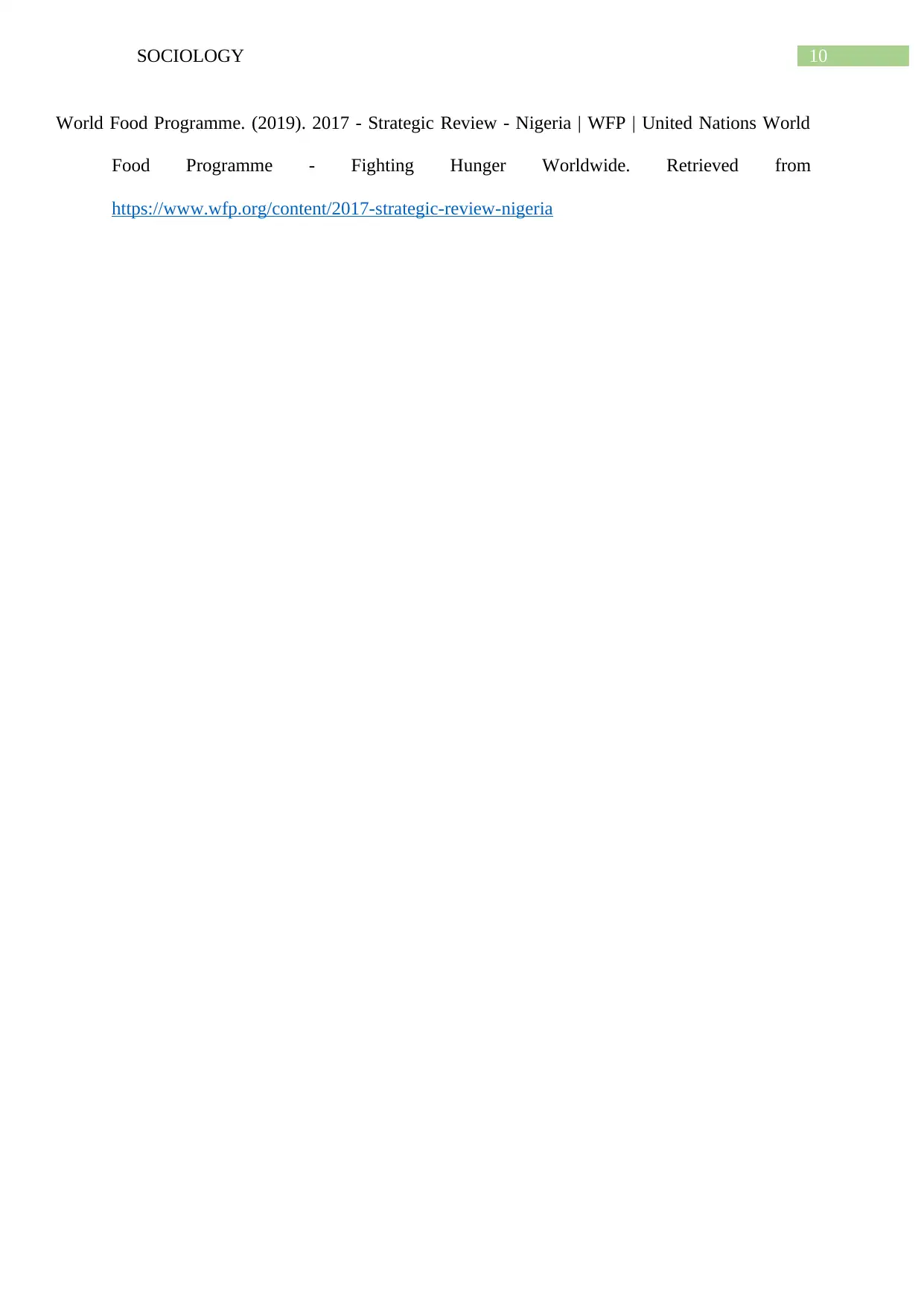
10SOCIOLOGY
World Food Programme. (2019). 2017 - Strategic Review - Nigeria | WFP | United Nations World
Food Programme - Fighting Hunger Worldwide. Retrieved from
https://www.wfp.org/content/2017-strategic-review-nigeria
World Food Programme. (2019). 2017 - Strategic Review - Nigeria | WFP | United Nations World
Food Programme - Fighting Hunger Worldwide. Retrieved from
https://www.wfp.org/content/2017-strategic-review-nigeria
1 out of 11
Related Documents
Your All-in-One AI-Powered Toolkit for Academic Success.
+13062052269
info@desklib.com
Available 24*7 on WhatsApp / Email
![[object Object]](/_next/static/media/star-bottom.7253800d.svg)
Unlock your academic potential
Copyright © 2020–2026 A2Z Services. All Rights Reserved. Developed and managed by ZUCOL.





